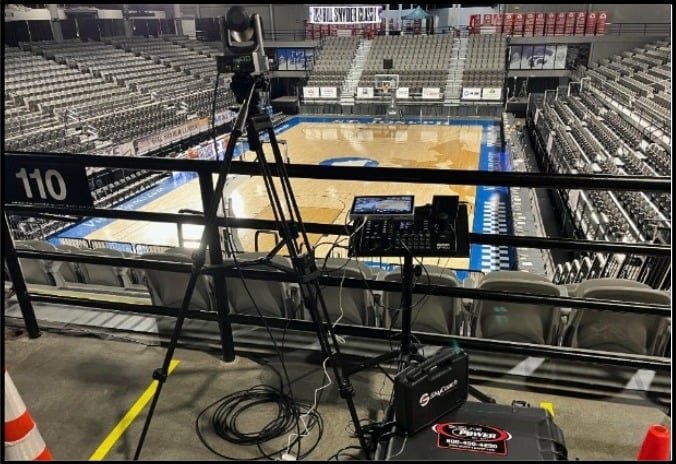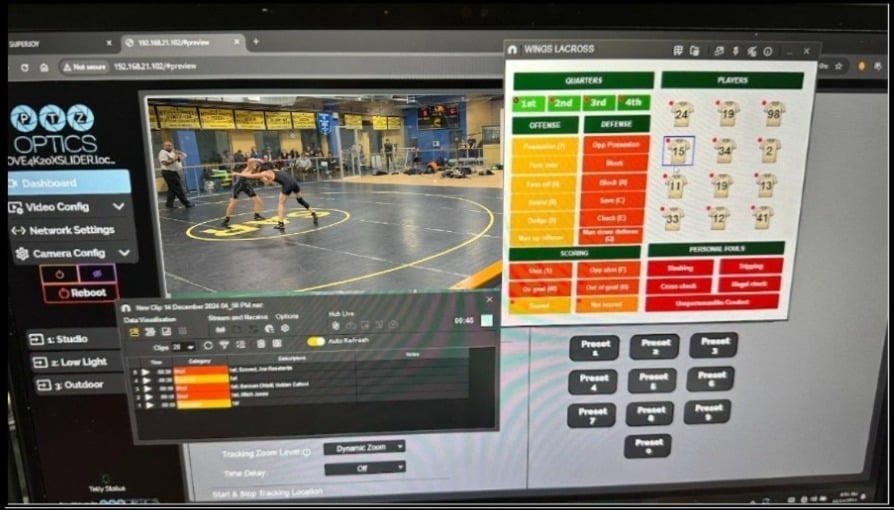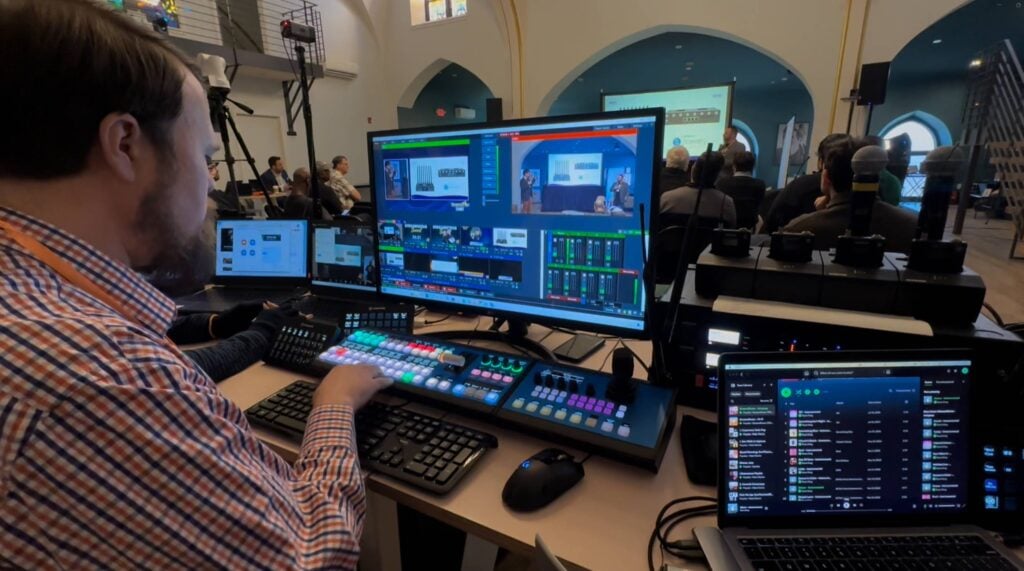How to use and make Stingers Transitions in OBS
Written by Paul Richards on January 29, 2019
Stingers are a type of animated video transition that is now available in the latest version of Open Broadcaster Software. In this video, Paul Richards shows you how to use stinger transitions inside of your video production and how to make a custom Stinger video to be used inside OBS.
The stinger transition is an animated transition that everybody has grown to love. The effect combines a transparent video animation that evolves into a full-screen overlay which is timed with a cut transition. When your stinger video animation starts playing on top of your current video, you can program your production software to cut to your preview video input exactly when the video completely covers up the current scene. The stinger effect has been made popular by sports broadcasts who use the effect to notify the audience of a particular scene change. In this way, sports broadcasts have trained their audience to expect a stinger transition when an instant replay or prepared video screen is coming up. Really fancy stinger video animations often include perfectly timed audio which is included with lots of “whooshes” and “pops” perfectly timed to give the animation a realistic look. Remember that viewers have likely never heard of a “stinger effect” yet the nonverbal connection that is made to the audience takes effect immediately.

Make a Stinger in After Effects
Let’s create our own custom stinger transition inside Adobe After Effects and import our work into both OBS and vMix for testing. In order to build a stinger, we want to create a 1920×1080 scene with an object that slides into the scene quickly, makes a brief appearance and then covers the entire area on exit. At the moment our stinger covers the entire screen, we will tell our video production software to initiate a cut. In this way, the stinger can create an animation that displays itself over any input we want to use it with.
Let’s start by opening up Adobe After Effects and creating a new 1920×1080 composition that is two seconds long. Next, we can drag in a .png file of our logo that we will use as our main file to animate. Let’s drag and drop this logo into our composition and click the drop-down arrow next to the title line to reveal the “transform” area. The transform area of our .png logo file is how we will tell After Effect how we want our logo to move throughout the two seconds of our composition. Let’s use the scale transformation option. To start a transform session, click the clock logo which will turn on animation over time and create a keyframe for us to use at the very first frame of our composition. Let’s scale you image to fill up the whole screen. Then you can drag your timeline slider to over a few tenths of a second. Now you can scale the logo down to a smaller size and After Effects will animate the transformation in between each of these two keyframes. Now let’s add a rotation into the mix, creating a keyframe at the zero mark and a keyframe exactly where our logo stops scaling. Finally, we can end our composition by scaling our logo past full screen toward the end of our 2-second composition. This is the point where our logo will cover the full screen and perform the cut to our next video input in the preview. Now that our animation is complete, we can export this video as an AVI file. Make sure to click the RGB + Alpha channel option when you are outputting a transparent video file from Adobe After Effects.

OBS Stinger Effect Setup
To set up our stinger video transition inside OBS first make sure you have the most up to date version of OBS (22 or later is required). Then click on the plus button inside the Scene Transitions area and select “Stinger”. This will open up a properties box where we can choose our .avi file and choose a transition point for our stinger. Since our stinger is 2 seconds long let’s choose 1900 milliseconds for our transition point which is just one-tenth of a second before our animation ends. The transition point is the time that OBS uses to cut between the preview and output scenes regardless of how much time is left on your animation. In this way, we want the animation to play into the next scene. We can now click the plus button in between our preview and output screens to add our stinger to our click transition button list used in studio mode.
TIP: You can set up a hotkey in the settings area of OBS for transitions. Consider using the spacebar as a hotkey for quickly cutting between two scenes. Once this is done you can set up another hotkey just for the stinger effect.
Check out our other articles about Open Broadcaster Software below:
- Updated - How to connect OBS and Zoom with VoiceMeeter and Headphone Monitoring - here.
- Learn how to use OBS for remote production here.
- How to connect OBS with Zoom, here
- OBS vs vMix a complete review here.
- How to use Zoom for Church Meetings and Worship here.
- Here are the top 10 OBS features you need to know about
- Getting dropped frames in OBS. Here are some new feature to help with that.
- Take a look at OBS 24 and all the new feature here.
- Increase your productivity with OBS and learn how to use hotkeys here
- Learn how to setup animated stinger transitions in OBS here
- Learn how to install the NDI plugin for OBS (and why you should) here
- Learn more about the latest OBS user interface (UPDATED for 2019) here
- Make your audio in OBS sound great with these VST 2 plugins here
- Learn how to fix the most common OBS issues! Audio and Video Sync! here
- Learn how to use OBS 20+ here
- Learn how to use NDI Cameras with OBS here
- Learn how to use the OBS Multiview here
- Learn OBS quickly with our ZERO to SIXTY tutorial video here
- Learn more about OBS settings and optimizing your settings for live streaming here
- Learn how to record videos using OBS here
- New OBS 24 feature allows broadcasters the ability to pause and restart video recordings. Learn more here.
- Learn how to add live annotations over your OBS productions here
- Learn how to add a webcam and set up a picture in picture scene inside OBS here
- Learn how to crop and rotate inputs inside OBS here
- Learn how to use color correction tools and LUTs here
- Learn the best way to connect OBS and Zoom here
- Learn how to connect OBS and Teams here
- Learn how to use countdown timers in Teams here
- Learn where OBS recordings are saved here
- Learn how to live stream to YouTube and Facebook with OBS for free here
- Learn about OBS 27's new features here





